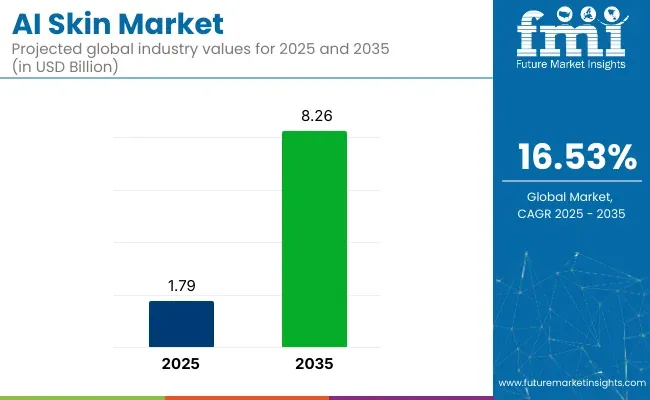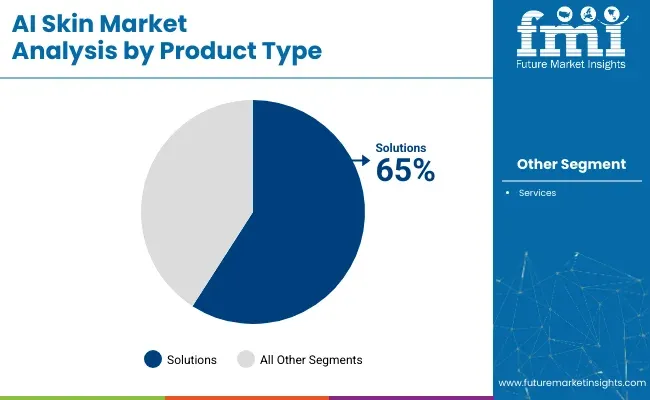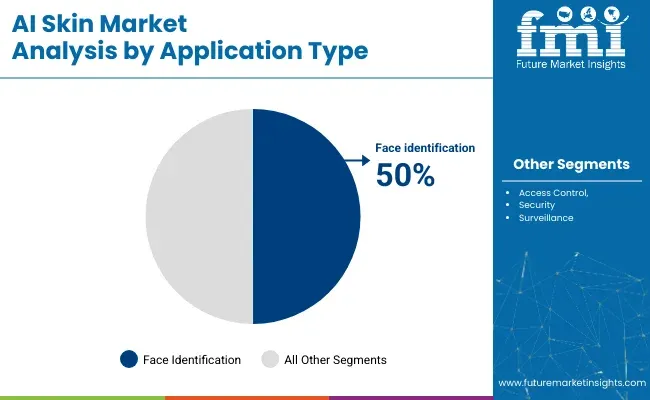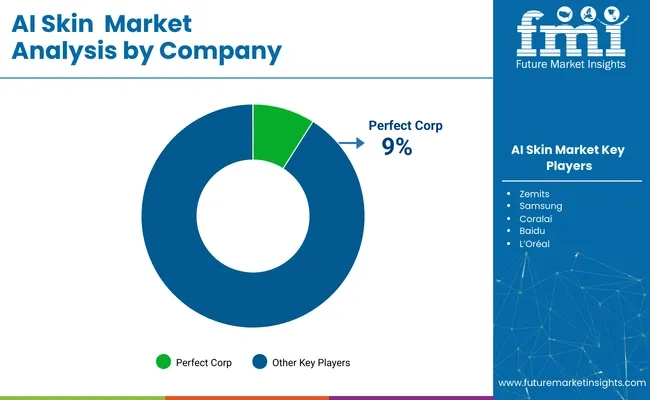The global AI skin market is forecasted to expand from USD 1.79 billion in 2025 to USD 8.26 billion by 2035, exhibiting a CAGR of 16.53% during the projection period. Market growth is being driven by increasing demand for advanced dermatological diagnostic tools and personalized skincare solutions.
The integration of artificial intelligence (AI) technologies with skin analysis systems is enabling faster, more accurate, and non-invasive assessments of various skin conditions. Rising consumer awareness about skin health, combined with continuous technological innovation, is accelerating the adoption of AI-based skin analysis tools in healthcare and cosmetic sectors worldwide.
AI-powered systems are being utilized to assess skin parameters such as wrinkles, pigmentation, hydration, and texture. Machine learning algorithms and computer vision techniques are being applied to generate real-time diagnostics and personalized treatment recommendations.

| Attribute | Value |
|---|---|
| Market Size in 2025 | USD 1.79 billion |
| Market Size in 2035 | USD 8.26 billion |
| CAGR (2025 to 2035) | 16.53% |
These technologies are being incorporated into dermatology clinics, cosmetic research centers, and skincare product development pipelines. Virtual skin consultations and remote monitoring are being facilitated through AI platforms, enhancing accessibility and convenience for end-users. Smartphone applications equipped with AI algorithms are also expanding the reach of skin analysis solutions to a wider consumer base.
Enhanced capabilities in the skincare retail journey are being provided by AI skin technology through the combination of brand skincare product recommendations with AI-driven skin analysis. Personalized visual representations of clear skin appearances are also being offered through AI skin simulation technology.
This was highlighted by Alice Chang, Founder and CEO of Perfect Corp, who stated, “AI skin technology offers enhanced capabilities of the skincare retail journey by combining brands’ skincare product recommendations with AI Skin Analysis. Furthermore, AI skin simulation technology allows for a personalized visual representation of clear skin appearances.” The market expansion is further supported by the growing popularity of teledermatology, mobile apps, and innovations in AI algorithms and user interfaces
AI skin is witnessing strong investment in intelligent diagnostic solutions and facial recognition tools, as skincare brands and dermatology platforms prioritize personalized recommendations and real-time virtual skin assessments.
Solutions are expected to dominate the market in 2025 with a 65% share, driven by increasing deployment across dermatology clinics, beauty retailers, and direct-to-consumer skincare apps. Companies like Haut.AI and L’Oréal’s ModiFace offer advanced AI-based analysis that detects wrinkles, dark spots, and skin hydration levels.

Perfect Corp’s YouCam platform is widely adopted in e-commerce and retail for product matching and regimen personalization. These solutions integrate AI with cloud storage and real-time image capture, enabling brands to provide science-backed skincare recommendations at scale. With SaaS-based models and cross-platform compatibility, solution providers are empowering users to make data-driven skincare decisions while enhancing customer engagement.
Face identification will remain the dominant application, capturing 50% of the AI skin market in 2025. Brands such as Revieve and OK Capsule are using facial mapping to deliver personalized skincare routines and assess skin age, texture, and tone. Cutitronics integrates face ID into connected devices for dynamic hydration tracking and user feedback.

This application is increasingly embedded into smartphones, beauty kiosks, and at-home devices, offering convenience and precision. Face ID-based assessments also enable longitudinal tracking, helping users monitor skin health over time. As visual-first diagnostics gain popularity, this segment continues to lead AI adoption in personalized beauty.
In 2025, 3D facial recognition is expected to lead the AI skin market by technology, driven by its advanced imaging precision and growing integration in dermatology clinics and smart skincare devices. Unlike 2D recognition, 3D mapping captures skin contours and depth with greater accuracy, enabling detailed analysis of pores, wrinkles, and texture.
Brands such as L’Oréal and Perfect Corp are embedding 3D facial scanning in virtual try-on tools and AI skin assessment platforms. The ability to perform real-time skin diagnostics with higher reliability makes 3D recognition the preferred choice for personalized skincare recommendations and aesthetic assessments globally.
Robust growth is being experienced in the AI skin market, driven by advancements in artificial intelligence and increasing demand for personalized skincare solutions. However, market expansion is being impacted by data privacy concerns and the requirement for diverse training datasets.
Advancements in AI technology are enhancing skin accuracy and personalization
Recent developments in artificial intelligence, particularly deep learning algorithms, have significantly improved the accuracy of skin condition assessments. AI-powered tools can now analyze various skin concerns, including acne, pigmentation, and wrinkles, providing users with personalized skincare recommendations.
These advancements are enabling more precise diagnostics and tailored treatment plans, enhancing user satisfaction and driving market growth. Additionally, the integration of AI with mobile applications and wearable devices is expanding the accessibility of skin tools, allowing consumers to monitor their skin health conveniently and regularly.
Data privacy concerns and the need for diverse training datasets are limiting market growth
Despite technological advancements, the AI skin market faces challenges related to data privacy and the need for diverse training datasets. The collection and analysis of personal skin data raise privacy concerns among consumers, potentially hindering widespread adoption.
Moreover, many AI models have been found to perform less effectively on images of diverse skin tones and uncommon diseases, indicating a need for more inclusive and representative training datasets. Addressing these issues is crucial for ensuring the reliability and fairness of AI skin tools, which will, in turn, support broader market acceptance and growth.
The AI skin analysis market is projected to expand rapidly. Growth is driven by rising digital skincare adoption, healthcare digitization, and innovation. India and China are leading growth. The United States and United Kingdom show steady advances.

| Countries | CAGR (2025 to 2035) |
|---|---|
| United States | 16.77% |
| United Kingdom | 15% |
| China | 18% |
| India | 20% |
| South Korea | 17.5% |
The United States AI skin market is projected to grow at a CAGR of 16.77% through 2035. Advanced AI research, digital skincare tools, and AI-powered skin diagnostics are being widely adopted. Products developed by L’Oréal, Proven Skincare, and Neutrogena are commonly used for personalized skin health analysis.
Mobile apps integrating AI algorithms for early detection of skin conditions have been introduced. Strong healthcare infrastructure and supportive regulations facilitate market growth. The American Academy of Dermatology promotes AI integration in clinical practice. AI-based platforms such as HiMirror and SkinVision have gained traction among consumers, supporting the expanding market through personalized skincare solutions.
The United Kingdom’s AI skin market is expected to grow at an estimated CAGR of 15% through 2035. Growth is supported by expansion in Europe’s cosmetics industry and rising AI skincare technology adoption. AI-powered skin diagnostic tools and tele-dermatology platforms have been increasingly adopted.
Emerging startups such as Skin Analytics and Healcerion contribute to technological innovation. Regulatory policies encouraging digital health and consumer openness to AI enhance market penetration. AI-enabled e-commerce platforms with skin analysis capabilities have been launched, expanding reach. Personalized skincare formulations and AI skin health monitoring have been advanced through AI, driving steady market development.
The AI skin market in china is forecasted to grow at a rapid CAGR of 18% through 2035, driven by healthcare digitization and increased skin health awareness. Leading companies such as Perfect Diary, Tencent Health, and Meitu have integrated AI into skin diagnostic tools and beauty apps.
Government initiatives promoting digital health infrastructure have supported growth. Smartphone penetration and urbanization have enabled broad access to AI-powered tools. Increasing skin health awareness and disposable incomes drive demand. AI diagnostic tools are widely used in dermatology clinics and online platforms. The market is expanding quickly, supported by strong government and private sector collaboration.
Indian AI skin market is expected to grow at a CAGR of 20% through 2035, aligning with healthcare cloud computing expansion. AI-driven diagnostics have been introduced by companies like mCaffeine, Plixx.ai, and DermaAI. Smartphone usage and increasing health awareness support wide adoption.
Telemedicine and digital health platforms integrating AI skin analysis have expanded access, particularly in urban and semi-urban areas. Government initiatives such as the Digital India campaign and healthcare digitization promote market growth. Personalized skincare products formulated via AI algorithms have been launched by local and global brands. AI-powered mobile apps like SkinBuddy are gaining popularity, facilitating early skin condition detection and consumer engagement.
The AI skin market in south korea is expected to grow at a CAGR of 17.5% through 2035, powered by a strong beauty tech ecosystem. Industry leaders such as Amorepacific, LG Household & Health Care, and Innisfree have incorporated AI diagnostics in skincare products.
Consumer openness to cutting-edge technologies has accelerated adoption. AI-powered skin analysis devices and apps are widely used in clinics and retail environments. AI platforms like L’Oreal’sPerso and Your Skin Analyzer are gaining traction. The country’s robust e-commerce infrastructure enables easy access to AI skincare diagnostics. Continuous R&D efforts support product innovation, solidifying South Korea’s status as a global AI beauty technology hub.

The AI skin market is segmented into multiple tiers. Tier 1 is dominated by global beauty corporations, including L'Oréal, Procter & Gamble, and Estée Lauder, whose growth has been propelled by acquisitions and AI technology partnerships. For instance, a minority stake in ModiFace was acquired by L'Oréal in 2024 to enhance its AI skin analysis portfolio.
Tier 2 comprises companies such as Perfect Corp. and Revieve, which have been recognized for delivering AI-powered diagnostic tools and personalized skincare platforms Tier 3 consists of emerging startups and regional innovators like Skin Analytics, Mira Beauty, and SkinVision, which focus on niche markets with mobile app-based and cloud-powered AI solutions.
Recent Industry Developments
| Report Attributes | Details |
|---|---|
| Current Total Market Size (2025) | USD 1.79 billion |
| Projected Market Size (2035) | USD 8.26 billion |
| CAGR (2025 to 2035) | 16.53% |
| Base Year for Estimation | 2024 |
| Historical Period | 2020 to 2024 |
| Projections Period | 2025 to 2035 |
| Quantitative Units | USD billion for value |
| Components Analyzed (Segment 1) | Solutions, Services |
| Technologies Analyzed (Segment 2) | 2D facial recognition; 3D facial recognition; Thermal face recognition; Skin texture analysis |
| Applications Covered (Segment 3) | Face identification; Access control; Security & surveillance |
| Regions Covered | North America; Asia-Pacific; Europe; Latin America; Middle East & Africa |
| Countries Covered | United States; Canada; Germany; United Kingdom; France; China; India; Japan; Australia |
| Key Players Influencing the Market | Zemits; Samsung (lululab); Coralai; Palo Alto Research Center Incorporated; Galderma Holding SA; P&G; L’Oréal (Vichy Laboratoires); Baidu; Perfect Corp; Meicet Technology Co., Ltd.; Beijing Megvii Technology Co., Ltd.; Shanghai Shanglu Network Technology Co., Ltd. |
| Additional Attributes | Investment trends in AI algorithm development; Integration with teledermatology platforms; Device vs. smartphone adoption rates; Partnerships between tech firms and dermatology clinics; Data privacy & regulatory compliance (GDPR, HIPAA); Personalization and recommendation engine capabilities |
The AI skin analysis market is segmented by component into solutions and services.
By technology, the market includes 2D facial recognition, 3D facial recognition, thermal face recognition, and skin texture analysis.
By application, the market is categorized into face identification, access control, and security & surveillance.
The market covers regions including North America, Asia-Pacific, Europe, Latin America, and Middle East & Africa.
The AI skin analysis market is projected to reach USD 8.26 billion by 2035, growing at a CAGR of 16.53% from USD 1.79 billion in 2025.
Key players include Zemits, Samsung (lululab), Coralai, Palo Alto Research Center, Galderma, P&G, L’Oréal, Baidu, Perfect Corp, Meicet Technology, Megvii Technology, and Shanglu Network.
The growth is driven by increasing demand for personalized skincare, advancements in AI and machine learning, and a growing focus on skin health.
The market is expected to grow at a CAGR of 16.53% from 2025 to 2035.
The personalized skincare and beauty analysis segment is expected to dominate due to the rising demand for customized skincare solutions.






Full Research Suite comprises of:
Market outlook & trends analysis
Interviews & case studies
Strategic recommendations
Vendor profiles & capabilities analysis
5-year forecasts
8 regions and 60+ country-level data splits
Market segment data splits
12 months of continuous data updates
DELIVERED AS:
PDF EXCEL ONLINE
Snail Mucin Skincare Market Growth – Trends & Forecast 2024-2034
Post-Surgery Skin Repair Market Analysis - Size and Share Forecast Outlook 2025 to 2035
Cocoa-Derived Peptides For Skin Repair Market Size and Share Forecast Outlook 2025 to 2035
Airless Paint Spray System Market Size and Share Forecast Outlook 2025 to 2035
AI Powered Software Testing Tool Market Size and Share Forecast Outlook 2025 to 2035
AI Document Generator Market Size and Share Forecast Outlook 2025 to 2035
AI in Fintech Market Size and Share Forecast Outlook 2025 to 2035
Air Caster Skids System Market Size and Share Forecast Outlook 2025 to 2035
AI-Driven HD Mapping Market Size and Share Forecast Outlook 2025 to 2035
AI Platform Market Size and Share Forecast Outlook 2025 to 2035
AI-powered Spinal Surgery Market Size and Share Forecast Outlook 2025 to 2035
AI-Powered Sleep Technologies Market Size and Share Forecast Outlook 2025 to 2035
AI-Powered Gait & Mobility Analytics Market Size and Share Forecast Outlook 2025 to 2035
AI-Powered Behavioral Therapy Market Size and Share Forecast Outlook 2025 to 2035
AI-Enabled Behavioral Therapy Market Size and Share Forecast Outlook 2025 to 2035
AI-powered In-car Assistant Market Forecast and Outlook 2025 to 2035
Airborne Molecular Contamination Control Services Market Forecast and Outlook 2025 to 2035
Airflow Balancer Market Size and Share Forecast Outlook 2025 to 2035
Aircraft Cabin Environment Sensor Market Forecast and Outlook 2025 to 2035
AI-defined Vehicle Market Forecast and Outlook 2025 to 2035

Thank you!
You will receive an email from our Business Development Manager. Please be sure to check your SPAM/JUNK folder too.
Chat With
MaRIA